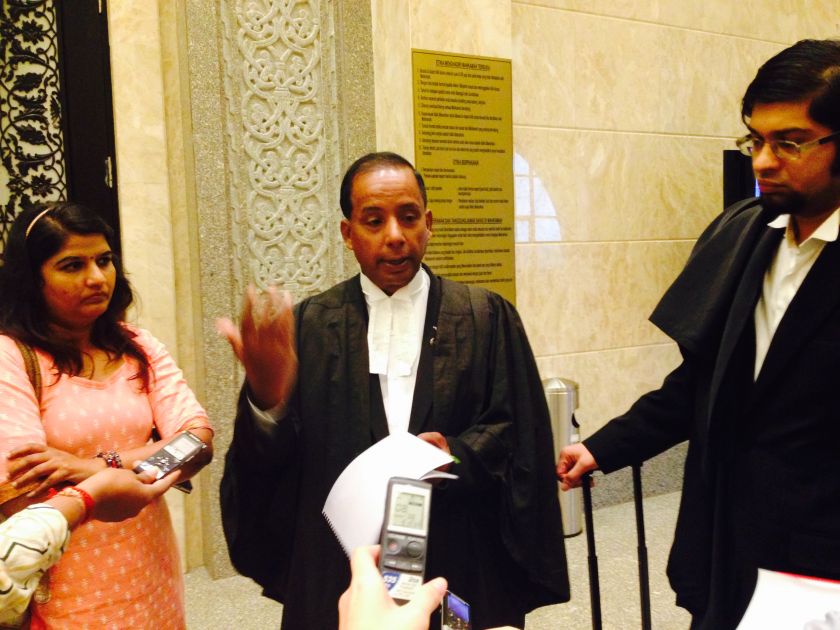KUALA LUMPUR, Nov 21 — A Hindu mother, whose interfaith custody battle became the personification of the problem, today lauded Putrajaya’s proposal to legally ban unilateral child conversions that would prevent ordeals such as her own.
De facto law minister Datuk Seri Azalina Othman Said today submitted the Law Reform (Marriage and Divorce) (Amendment) Bill that proposes to prevent single spouse conversions to Islam from unilaterally affecting either civil marriages or the children born from these.
“I’m so happy that finally the much awaited Bill has been amended,” M. Indira Gandhi, who has been locked in such a tussle for nearly seven years, told Malay Mail Online.
“It’s a relief and citizens of Malaysia will applaud the move by our government,” she said via text message.
Indira, who has been battling to get custody of her children since 2009, said the government is moving in the right direction with the proposed amendments.
“Hopefully it can be the answer in many prayers,” she added.
The new Bill, which also specifically addressed the “Religion of a Child” in civil marriages where one spouse has converted to Islam, said that the child will remain in the religion of the parents at the time of marriage until the child is 18 years old, when he many choose his own religion.
Indira’s lawyer, M. Kulasegaran, also welcomed the tabling of the Bill, and dubbed it as the “Indira Gandhi” amendments.
“From my reading I feel relevant controversial issues have been included,” Kulasegaran, who is also a federal lawmaker, told Malay Mail Online when contacted today.
He expressed concern, however, that the Bill will only be debated in the next Dewan Rakyat’s meeting next year.
Kulasegaran then proposed that Azalina “fast track” the Bill, in order to provide relief to other families who may be experiencing what Indira went through.
“Many Malaysians are suffering in silence especially those whose children have been converted to Islam by a single parent,” he said later at a press conference in Parliament.
He added that he meet other lawyers involved in similar cases to dissect the Bill.
The proposed amendment also said that if the parties to the marriage professed to different religions prior to one spouses conversion to Islam, “a child of the marriage shall be at liberty to remain in the religion of either one of the prior religions of the parties before the conversion to Islam.”
The issue of unilateral conversions became controversial in recent years after several cases, including Indira and S Deepa’s cases, who both faced lengthy court battles to gain custody and also reverse the unilateral conversion of their children by their Muslim convert ex-husbands.
Deepa’s lawyer, Joanne Leong, said reforms to family law were a necessity due to the growing changes of the society.
While she said she welcomed the current proposal, Leong said the changes may not provide sufficient clarity to prevent interfaith custody battles in all situations.
She cited an example of where a parent converts the child to Islam before his own embrace of the religion as one that may confound the proposal in its current form.
“It’s a first of hopefully many further amendments to the law reform act to protect the children especially on unilateral conversion,” she added.
Family law practitioner Honey Tan said the proposal would have far-reaching ramifications beyond the obvious, including fundamentally changing the futures of children who would otherwise be affected by unilateral conversions.
Such children will not be made to choose religions before they can understand the significance, Tan added when saying the amendment would heal an old schism in Malaysian society.
“More children can now continue with their tertiary education since fathers now cannot get out of paying for their children’s maintenance even after the children are over 18 years old,” Tan said.
Association of Women Lawyers President Goh Siu Lin said the new developments would bring to life Malaysia’s international obligations within the spirit of the United Nations’ Convention on the Elimination of all Forms of Discrimination Against Women.
“We are optimistic that with the proposed Bill, this will finally resolve the legal uncertainty created by the parallel civil and Shariah legal systems and recognise that a mother has an equal right to decide on important matters [such as religion)] over her child in a civil marriage,” she said.
The Malaysian Consultative Council of Buddhism, Christianity, Hinduism, Sikhism and Taoism (MCCBCHST) said the proposal was long overdue and will help address the pain that has resulted from interfaith familial tussles.
Aside from unilateral conversion of minors, the proposed law also proposes to allow Muslim spouses to petition the civil courts for divorce, instead of only the Shariah courts as currently required.
The proposed amendments shall also apply retrospectively for any cases still pending in courts.
The problems with unilateral child conversions persisted despite a 2009 Cabinet ruling prohibiting the practise, due to the lack of legal weight behind the decision.
Putrajaya had since then been pressed to codify its decision into law, as it has done today.



















